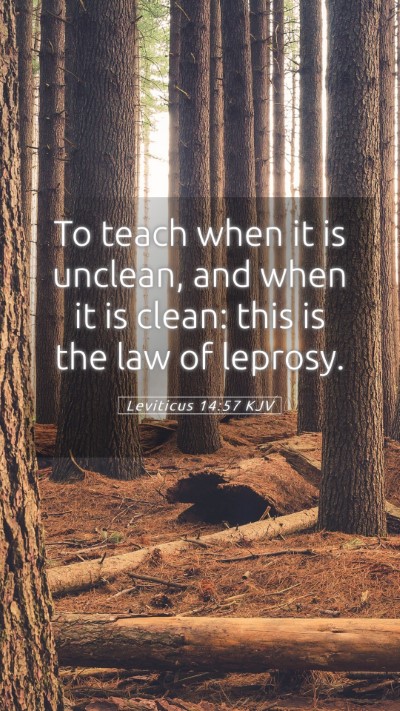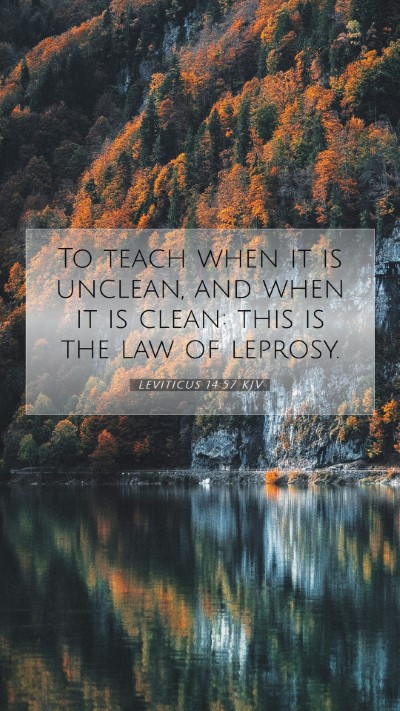Understanding Leviticus 14:57
Leviticus 14:57 states, "and for all that is not spoken, you shall be unclean and be an unclean article." This verse concludes the guidelines set forth for determining cleanliness regarding various skin diseases and mildew in houses.
Summary of Biblical Context
The chapter revolves around God's instructions to the Israelites regarding the treatment and evaluation of leprosy and related diseases. These public health regulations were not only practical but also had a spiritual significance, reflecting God's holiness and the importance of purity in community life.
Insights from Commentaries
-
Matthew Henry:
Henry emphasizes the necessity of external purity as a representation of internal holiness. This verse finalizes the assessment that, in cases where something remains unspoken or unclear in terms of cleanliness, one would still be rendered unclean. Hence, the attention to detail and obedience in these laws illustrates a broader principle of maintaining a relationship with God.
-
Albert Barnes:
Barnes indicates that the verse serves as a reminder that not everything can be accounted for or easily categorized. In this manner, it reflects God’s omniscient understanding of purity, suggesting humankind's limited visibility into spiritual realities. The need for careful consideration of cleanliness signifies deeper spiritual truths regarding sin and its pervasive nature.
-
Adam Clarke:
Clarke draws attention to the idea that this verse illustrates the broader implications of ceremonial law. He suggests that God’s, even seemingly mundane, regulations are crucial for understanding the symbolic nature of sin and redemption - which are primary themes in both the Old and New Testaments. Thus, the verse implies that any situation not explicitly identified still carries the burden of being 'unclean', emphasizing the inescapability of sin.
Key Themes and Reflections
- Holiness: The idea of being set apart for God and the necessary steps taken to maintain this state.
- Understanding Sin: The connection between these laws and the overarching concept of sin being not just an act but a state of being.
- Community Practices: How communal health regulations participated in maintaining spiritual order within the Israelite community.
- God's Sovereignty: The acknowledgment that human understanding is limited and that God has ultimate authority over what is clean and unclean.
Application of Leviticus 14:57
This verse, while specific to its ancient context, challenges modern believers to consider how they approach spiritual purity in their own lives. It urges an examination of personal conduct, social interactions, and community values through the lens of God's standards.
- In practical applications, Christians can assess their lives to understand the areas where they may stray from God's call.
- This verse encourages looking introspectively at one’s living environment and relationships, ensuring they reflect holiness and purity.
- It highlights the value of transparency and open communication about struggles concerning sin and impurity.
Cross References
- Leviticus 13:3: Instructions for diagnosing leprosy.
- Numbers 5:2-3: Laws concerning unclean persons in the camp.
- Matthew 8:2-3: Jesus's healing of a leper, demonstrating His authority over impurity.
Further Study and Resources
For those looking to delve deeper into the study of Leviticus 14:57 and similar topics, consider utilizing the following resources:
- Joining bible study groups to engage in discussions.
- Using bible study tools and bible study guides for facilitated learning.
- Exploring online bible study courses for comprehensive insights.
Conclusion
In summary, Leviticus 14:57 encapsulates the importance of understanding cleanliness and impurity within a biblical context. The insights gathered from prominent commentaries prompt readers to explore deeper layers of meaning and application in both historical and contemporary settings. By striving for clarity and purity in our spiritual lives, we echo the sentiments of covenant faithfulness showcased throughout Scripture.


